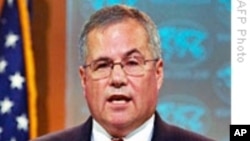Close to 1,000 student opponents of the genocide in Darfur capped a long weekend of rallies and congressional lobbying with a question and answer session yesterday at the White House. Less than a month after the Obama administration unveiled its Sudan policy review, Special Envoy Scott Gration and National Security Council Senior Director for Multilateral Affairs Samantha Power fielded questions about U.S. determination to make ending the Sudan violence a top policy priority for the new president.
Harvard University senior Layla Amjadi posed yesterday’s inquiries as the director of STAND, the student-led division of the Genocide Intervention Network, which organized the five-day program for student advocates from across the United States. She says that the White House took an important step to open a dialogue with activists who helped President Obama win the 2008 election.
“Overall, the fact that the White House, General Gration and Samantha Power, have opened up and allowed the communication to begin is a positive sign, I think, that the outreach to the activist community is encouraging. And STAND is very honored to have seats at the table on Tuesday. However, I think that activist students were disappointed at the lack of (administration) answers. Looking at some of the feedback on Twitter and Facebook and emails, it seems as though students are still frustrated. They’re not getting the answers,” she observed.
Tuesday’s White House panel was the final Washington Darfur event for students, who had spent the previous four days in the U.S. capital holding workshops, consulting and lobbying with legislators and congressional aides, and utilizing a stunning array of modern technological tools, from webcams to mobile phones, to illustrate their commitment for legislative action to stop Sudanese genocide and mass atrocities.
They hand-delivered 100 personalized videos to the offices of the 100 U.S. senators and created a total of 500 video messages for their legislators, all conveying the sense of urgency and importance of strengthening U.S. Darfur policy. STAND’s Amjadi says the anti-genocide coalition’s program was well received.
“We’ve actually heard great response from our activists. We did go on the (Capitol) Hill on Monday. Many of them (the students) reported back on how pleased they were with how receptive their elected officials and foreign policy legislative aides were. And so I think this really shows the importance of students and citizens taking their places as active citizens in building those relationships, because as citizens, we do have the power to direct what our government’s actions are when it comes to mass atrocities and genocide,” she pointed out.
During the 2008 U.S. presidential campaign, Senator Barack Obama’s African family background and his outspoken commitment to ending the Darfur violence won high marks, particularly from young American voters and helped energize his candidacy. Support on college campuses benefitted Obama, even though U.S. Sudan policy earlier earned wide bipartisan support from Democratic and Republican political leaders alike in previous years.
But STAND director Layla Amjadi says students this week in Washington are frustrated by concerns that the Obama administration is losing ground because of delays and its reluctance to elevate Darfur policy to a higher profile.
“Participants were really frustrated by how vague the policy review was on benchmarks and pressures and incentives. Activists wanted to hear how were these decisions being made and what constitutes an incentive. What constitutes pressure? And what are the standards for which they’ll be deployed?” she asked.
Another concern raised Tuesday at the White House was how to ensure that Sudanese civil society be given a voice to help the country recover from its turbulent past and how to help Sudan’s more than two million refugees and displaced persons living in camps return home.
“Activists wanted to know when can these people go back, whether it be weeks, months, or years, and on that question, we failed to receive a specific time frame,” she noted.
Amjadi expects a major test of the U.S. administration’s resolve on Darfur to come up later this week when President Obama travels to China. She says student activists are hoping to hear that Mr. Obama brings the Darfur situation up with Chinese officials and President Hu Jintao and achieves progress to curb Beijing’s attempts to arm Khartoum and extend political support that encourages further violence.




